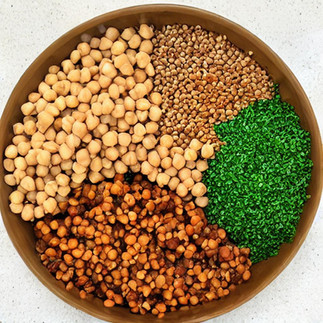A vegetarian diet is often considered better for the environment for several reasons. In today's world, there are a lot of amazing, yummy recipes out there to make vegetarian food or vegan food or even use plant-based food to keep up with your appetite!
Some of the benefits of switching to a vegetarian diet include:
Reduced greenhouse gas emissions: Livestock farming, particularly beef and lamb production, generates significant amounts of greenhouse gases, including methane and nitrous oxide, which contribute to climate change. Vegetarian diets typically have a lower carbon footprint because they involve fewer emissions.
Cruel Cattle Rearing Practices: With an increasing and ever so growing population we have been growing livestock including but not limited to chicken, pigs, cows, etc., in horrible conditions. We need to remember that it all stems from demand and supply. If we reduce meat consumption and reduce demand, it will eventually lead to better cattle-rearing practices.
Conservation of natural resources: Producing animal-based food requires more resources, such as land, water, and energy, compared to plant-based foods. For example, growing crops for animal feed consumes vast amounts of land and water. By choosing a vegetarian diet, you can help conserve these valuable resources and reduce the pressure on ecosystems.

Reduced deforestation: The demand for animal agriculture is a significant driver of deforestation, especially in regions like the Amazon rainforest. Trees are often cleared to make way for livestock grazing or to grow feed crops. Deforestation not only leads to biodiversity loss but also releases stored carbon into the atmosphere. By opting for a vegetarian diet, you can indirectly contribute to the preservation of forests. Plant-based agriculture can be explored via alternatives such as hydroponics, vertical farming, etc. to help tackle land utilization issues.
Decreased water usage: Livestock farming requires substantial amounts of water for drinking, irrigation, and processing. By reducing or eliminating animal products from your diet, you can help conserve water resources. It takes much less water to produce plant-based foods compared to meat, dairy, and eggs.
Minimized pollution: Livestock farming contributes to water and air pollution. Animal waste can contaminate water bodies, leading to harmful effects on aquatic ecosystems and human health through issues like eutrophication. Additionally, intensive livestock production releases air pollutants such as ammonia and hydrogen sulphide. By choosing a vegetarian diet, you can help mitigate these pollution sources.
It's important to note that not all vegetarian diets are equal in terms of environmental impact. Factors such as food choices, sourcing, and production methods play a role. A well-planned vegetarian diet that includes a variety of plant-based foods can have a positive environmental impact.
It also should be noted that by including a variety of plant-based food items into the diet a balanced diet can be achieved. Some examples are listed below.
1. Protein: Include plant-based sources of protein such as legumes (beans, lentils, chickpeas), tofu, tempeh, seitan, quinoa, nuts, and seeds. These provide essential amino acids necessary for the body.
2. Whole Grains: Incorporate whole grains like brown rice, quinoa, oats, whole wheat bread, and whole wheat pasta. These are rich in fiber, B vitamins, and minerals.
3. Fruits and Vegetables: Consume a wide range of colorful fruits and vegetables to obtain essential vitamins, minerals, antioxidants, and fiber. Include leafy greens, berries, citrus fruits, cruciferous vegetables (broccoli, cauliflower), and other seasonal produce.
4. Dairy Alternatives (optional): If you consume dairy alternatives, choose fortified options like soy milk, almond milk, or oat milk to ensure you get enough calcium and vitamin D.
5. Healthy Fats: Include sources of healthy fats such as avocados, nuts, seeds, and olive oil. These provide essential fatty acids and fat-soluble vitamins.
6. Legumes and Pulses: Incorporate a variety of beans, lentils, chickpeas, and other legumes. They are excellent sources of protein, fiber, iron, and other minerals.
7. Nuts and Seeds: Add nuts like almonds, walnuts, cashews, and seeds such as chia seeds, flaxseeds, and pumpkin seeds to your diet. These are rich in protein, healthy fats, and micronutrients.
8. Fortified Foods and Supplements: Consider fortified foods or supplements for nutrients like vitamin B12, iron, and omega-3 fatty acids, which may be harder to obtain in a vegetarian diet.
Remember to balance your meals, and eat in moderation. It's also a good idea to consult with a registered dietitian or nutritionist to ensure you're meeting your specific nutritional needs.
In conclusion, a vegetarian diet is a good way to support climate change mitigation. You can even start by reducing meat consumption, once a month without having to give meat up completely. Remember it is all about reducing demand and supply.








Comments